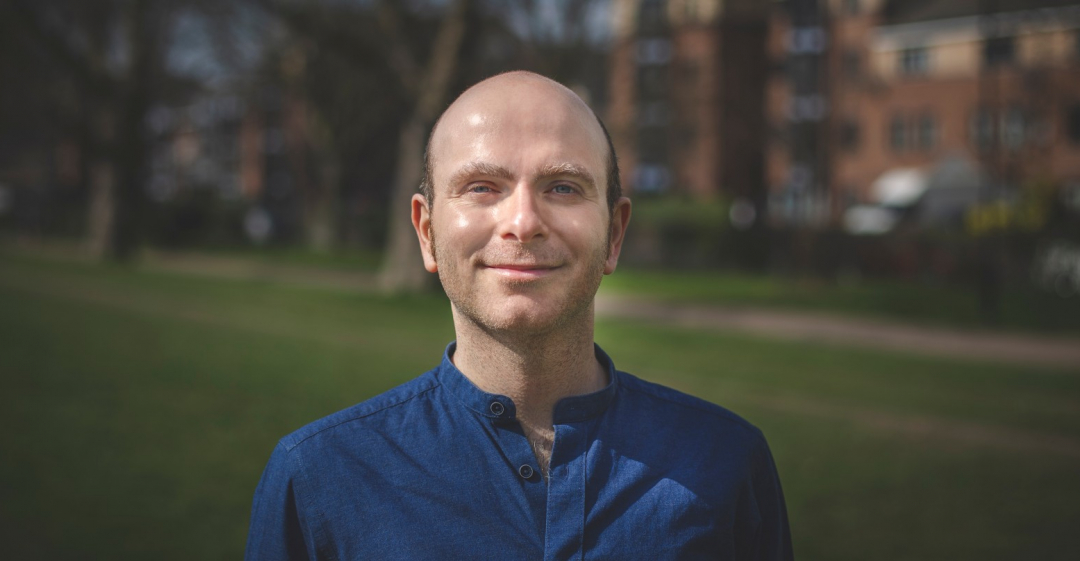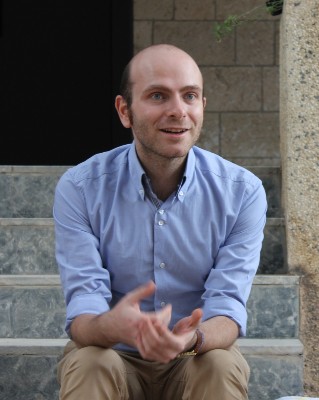“I wanted to do more than just working ten hours a day and giving up weekends.”

What work were you doing previously?
Having worked with environmental and human rights organisations at the start of my career, for the last thirteen years I was working in the humanitarian sector.
My last role was Head of the Humanitarian Department in a large international development NGO.
What are you doing now?
I’m a freelance humanitarian management consultant and leadership coach, often working with humanitarian and other civil society organisations.
Although these two things are connected, they are also different; so it feels a bit like a portfolio career, which I really like.
How did you feel in your work before you decided to make the change?
I liked working in international development and humanitarian organisations, but recently I'd been feeling more and more distant with the causes the organisations were working for.
I guess I had the dilemma that many have when they grow in seniority and their work is less about what happens on the ground.
Don't get me wrong, I love being in a leadership role: inspiring teams and learning from them, creating partnerships with external stakeholders, leading and supporting my teams through the tough times and celebrating successes. But there were moments when office politics got in the way too much, and my frustrations with the sector's challenges became too many.
Although I’d always managed stress quite well, even thriving through it, I started feeling too worried about what was happening at work and my workload.
There were other things in life. I wanted to do more than just working ten hours a day or more and giving up weekends.
Why did you change?
For a combination of reasons.
Apart from the 'push factors' I mentioned earlier there also were 'pull factors'. The speed of changes and the sheer volume of things I was responsible for in my old job made me feel I did not have enough time to think and grow the way I wanted.
I wanted to try (even for a short period) a different way of living my everyday life. I wanted it to be less about work and more about connecting with people (and myself). And I wanted to test myself in new situations, to get out of my comfort zone.
When was the moment you decided to make the change?
The idea of working as a freelance consultant and leadership coach had been in my mind for a while before I made the decision.
Then one day, during a very hectic period at work, I realised that I was on a career trajectory that I wasn't sure I had chosen myself. I was just following the path of everyone else who'd climbed the seniority ladder. The worst thing was that I hadn't even had the time to stop and think about my choices.
So, once I'd gained solid experience and was ready, I realised it was time for me to take a leap of faith.
How did you choose your new career?
It felt like a very natural step and in many aspects it is not radically different.
As a freelance humanitarian management consultant I work with organisations in funding, programme and strategy, all areas that I've had experience of for over fifteen years and where I know I can bring value.
As a leadership coach with organisations, I bring my leadership experience, together with my qualifications in psychology and coaching. It was not exactly a revolution, but it worked very well for me.
Are you happy with the change?
So far, yes!
There have been ups and downs of course, and sometimes I questioned my decision, but I keep growing and learning, and this is valuable.
Most importantly, I continue working with amazing people and organisations that really matter to me.
What do you miss and what don't you miss?
I miss being part of a team.
I'd always been part of teams, and for most of my career I was managing teams myself. Belonging and connecting with others for a shared purpose is very important to me and I miss it. However, I've now co-founded Positive Change Agents, a collective of leadership coaches and in a way we've created a team together.
I certainly don't miss the office politics and the frustrations of a sector which is so vulnerable and dependent on the decisions of politicians. 2020 saw the dismantling of the Department for International Development in the UK, a move that was condemned by virtually everyone in the sector.
How did you go about making the shift?
I was in a fixed-term contract role and was offered the chance to stay permanently, but I'd already decided that I wanted to start my freelancing career.
So I extended my contract for a few months more, to allow the organisation to find my replacement, and that was it.
It had been in my mind for at least a year. I'd planned what I wanted to achieve, the time I would need to build my pool of clients and the connections I needed to make, the time I needed to retrain, and a break to recharge my batteries before the transition.
I moved in with my partner the weekend I left my job, which, apart from being a relationship plan, also helped me save some money. I'd planned the first 6–9 months and I told myself that if it didn't work I would go back to full-time employment.
What didn't go well? What wrong turns did you take?
As a freelancer you're always assessing your portfolio and making decisions on what project to pursue or not.
At one point, there was an opportunity that ticked many of my boxes, but it didn't feel exactly right. After a few days of considering it, and although I didn't have anything else in the pipeline, I decided to turn it down. I regretted it for a while as I would have loved to have had that experience, but recently I learnt that for several reasons my decision to follow my instinct was a good one.
Choosing or not choosing the right opportunities to work on hasn't always been easy, especially when I've been pressed with my monthly bills.
How did you handle your finances to make your shift possible?
This has been probably one of the trickiest parts.
Before I made the change I'd managed to put away savings for about nine months, plus enough for retraining fees. I felt confident enough that I would succeed, and if the worst-case scenario happened, I would go back to employment or have a short-term deployment, which I thought would have been easier to do.
What was the most difficult thing about changing?
Apart from the practicalities (that with some good planning can be manageable), the most difficult thing was for myself to accept my different professional identity.
For a while I felt that I was throwing all my years of past work experience away, while starting something that I was still learning about.
In reality though, everything you've done professionally remains part of you, and you just keep adding layers of experience and new skills. I left my last job as a senior manager; I feel now that I remain a senior humanitarian manager, and a freelance consultant and leadership coach as well.
Linked to that, sometimes it felt like I was betraying my younger self, who so consciously and idealistically chose to work in humanitarian organisations. It took time for me to accept that it is OK to want different things when you are almost 40, compared to what you wanted to do when you were 20.
What help did you get? 
Reading about career changes and understanding what can go wrong has definitely helped me.
I also spoke to a few colleagues who'd taken the same path, and I kind of buddied with an ex-colleague who was going freelance a couple of months after me. This peer support was very helpful, as we would exchange ideas and share frustrations. It felt very supportive.
Finally, I had a coach who helped me make sense of my choices, clarify my purpose and find my strengths in my new professional identity.
What resources would you recommend to others?
In my case, I read a lot about becoming a freelancer in the UK, registering with HMRC, creating a company (or not).
I also read a lot about branding, marketing and the best ways to find clients. There is a lot on the internet.
What have you learnt in the process?
Becoming a freelancer and starting your own business can be daunting.
I don't mind the exposure and I'm generally extroverted. It was the (false) idea that in order to market yourself you need to be a certain type that bothered me. I learnt in the process that the best way to market yourself is to be authentic.
I also learnt that there are at least five to six different marketing channels you could use, but it's better to stick to the ones you're good at. Some are great in using online advertising tools, others are great in social media, some do public speaking and blogging, and others are natural in networking. You can't be great in all of them.
What would you advise others to do in the same situation?
Go for the change that feels like you when you're at your best.
Fears and doubts will be there, and this is OK.
Freelancing gives you an enormous sense of choice and freedom, but at the same time the financial insecurity can at times be nerve-racking. Having some savings or another type of safety net is important. Have a plan and some financial stability for at least the first six months, and be ready to take some risks.
To find out more about Christos's collective, visit www.thepositivechangeagents.com.
What lessons could you take from Christos' story to use in your own career change? Let us know in the comments below.



